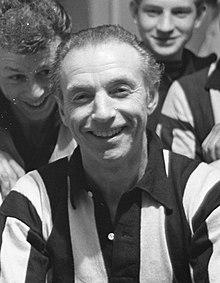
Emilio Butragueño Santos is a Spanish retired professional footballer who played as a striker.
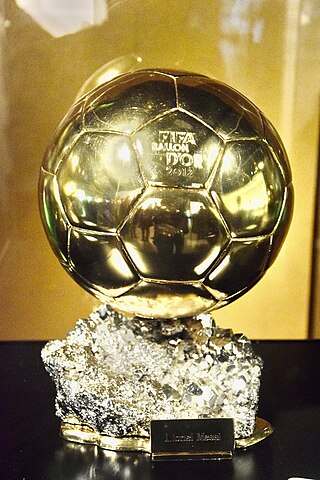
The Ballon d'Or is an annual football award presented by French magazine France Football since 1956 to honour the player deemed to have performed the best over the previous season.

Alfredo Stéfano Di Stéfano Laulhé was a professional footballer and coach who played as a forward, regarded as one of the greatest footballers of all time. Nicknamed "Saeta Rubia", he is best known for his achievements with Real Madrid, where he was instrumental in the club's domination of the European Cup and La Liga during the 1950s and 1960s. Along with Francisco Gento and José María Zárraga, he was one of only three players to play a part in all five European Cup victories, scoring goals in each of the five finals. Di Stéfano played international football mostly for Spain after moving to Madrid, but he also played for Argentina and Colombia.

Raymond Kopa was a French professional footballer, integral to the France national team of the 1950s. At club level he was part of the legendary Real Madrid team of the 1950s, winning three European Cups.

Luis Suárez Miramontes was a Spanish professional footballer and manager. He played as a midfielder for Deportivo de La Coruña, España Industrial, Barcelona, Inter Milan, Sampdoria; he also represented the Spain national team between 1957 and 1972. Regarded as one of the greatest Spanish football players of all time, Suárez was noted for his elegant and fluid style of play and also regarded to be one of the best playmakers of his generation.
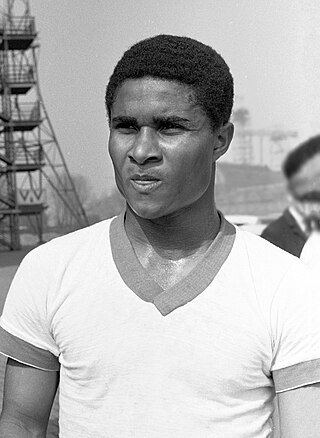
The 1965 Ballon d'Or, given to the best football player in Europe as judged by a panel of sports journalists from UEFA member countries, was awarded to Eusébio on 28 December 1965.

The 1994 Ballon d'Or, given to the best football player in Europe as judged by a panel of sports journalists from UEFA member countries, was awarded to Hristo Stoichkov on 20 December 1994.

The 1982 Ballon d'Or, given to the best football player in Europe as judged by a panel of sports journalists from UEFA member countries, was awarded to Paolo Rossi on 28 December 1982.

The 1991 Ballon d'Or, given to the best football player in Europe as judged by a panel of sports journalists from UEFA member countries, was awarded to Jean-Pierre Papin on 24 December 1991.

The 2002 Ballon d'Or, given to the best football player in Europe as judged by a panel of sports journalists from UEFA member countries, was awarded to Ronaldo on 12 December 2002. This was Ronaldo's second Ballon d'Or, his first award was in 1997.

The 2000 Ballon d'Or, given to the best football player in Europe as judged by a panel of sports journalists from UEFA member countries, was awarded to Luís Figo on 19 December 2000.

The 1957 Ballon d'Or, given to the best football player in Europe as judged by a panel of sports journalists from UEFA member countries, was awarded to Alfredo Di Stéfano on 17 December 1957.

The 1959 Ballon d'Or, given to the best football player in Europe as judged by a panel of sports journalists from UEFA member countries, was awarded to Alfredo Di Stéfano on 15 December 1959. It was the second time that Di Stéfano won the award.

The 1960 Ballon d'Or, given to the best football player in Europe as judged by a panel of sports journalists from UEFA member countries, was awarded to Luis Suárez on 13 December 1960.
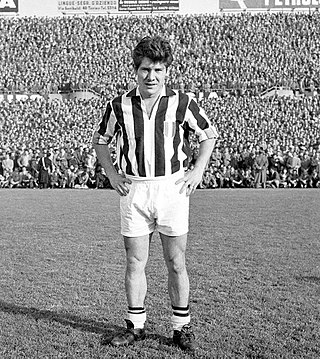
The 1961 Ballon d'Or, given to the best football player in Europe as judged by a panel of sports journalists from UEFA member countries, was awarded to Omar Sívori on 12 December 1961.

The 1989 Ballon d'Or, given to the best football player in Europe as judged by a panel of sports journalists from UEFA member countries, was awarded to Marco van Basten on 26 December 1989. There were 27 voters, from Albania, Austria, Belgium, Bulgaria, Czechoslovakia, Denmark, East Germany, England, Finland, France, Greece, Hungary, Italy, Luxembourg, the Netherlands, Poland, Portugal, Republic of Ireland, Romania, Scotland, Soviet Union, Spain, Sweden, Switzerland, Turkey, West Germany and Yugoslavia. Van Basten was awarded to Ballon d'Or for the second time.
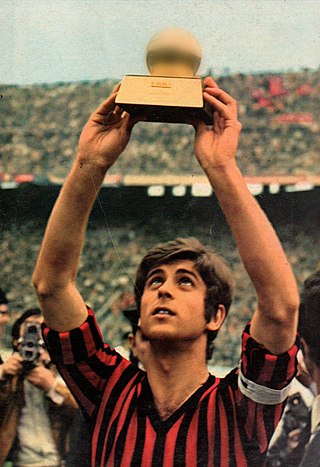
The 1969 Ballon d'Or, given to the best football player in Europe as judged by a panel of sports journalists from UEFA member countries, was awarded to the Italian midfielder Gianni Rivera (Milan) on 23 December 1969. There were 26 voters, from Austria, Belgium, Bulgaria, Czechoslovakia, Denmark, East Germany, England, Finland, France, Greece, Hungary, Italy, Luxembourg, the Netherlands, Norway, Poland, Portugal, Republic of Ireland, Romania, Soviet Union, Spain, Sweden, Switzerland, Turkey, West Germany and Yugoslavia. Rivera became the second Italian to win the award, after Omar Sívori in 1961. He was also the first Milan player to win the trophy.
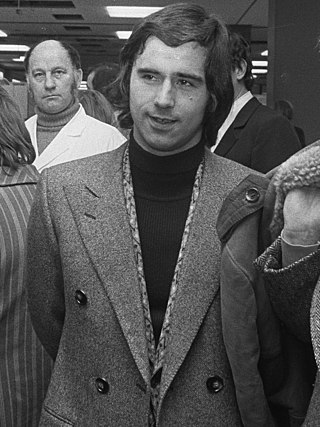
The 1970 Ballon d'Or, given to the best football player in Europe as judged by a panel of sports journalists from UEFA member countries, was awarded to the West German forward Gerd Müller on 29 December 1970. There were 26 voters, from Austria, Belgium, Bulgaria, Czechoslovakia, Denmark, East Germany, England, Finland, France, Greece, Hungary, Italy, Luxembourg, the Netherlands, Norway, Poland, Portugal, Republic of Ireland, Romania, Soviet Union, Spain, Sweden, Switzerland, Turkey, West Germany and Yugoslavia. Müller became the first West German national and the first Bayern Munich player to win the Ballon d'Or.

The 1974 Ballon d'Or, given to the best football player in Europe as judged by a panel of sports journalists from UEFA member countries, was awarded to the Dutch striker Johan Cruyff on 31 December 1974. There were 26 voters, from Austria, Belgium, Bulgaria, Czechoslovakia, Denmark, East Germany, England, Finland, France, Greece, Hungary, Italy, Luxembourg, the Netherlands, Norway, Poland, Portugal, Republic of Ireland, Romania, Soviet Union, Spain, Sweden, Switzerland, Turkey, West Germany and Yugoslavia. Cruyff became the first footballer to earn the award three times, following up from his wins in 1971 and 1973. French playmaker Michel Platini and Dutch compatriot Marco van Basten also won the Ballon d'Or three times after him.

The 2022 Ballon d'Or was the 66th annual presentation of the Ballon d'Or, presented by France Football, recognising the best footballers in the world during the 2021–22 season. For the first time in the history of the award, it was given based on the results of the European season, instead of the calendar year. The nominees for the ceremony were announced on 12 August 2022, and the ceremony was held on 17 October. Karim Benzema won the Ballon d'Or, for successfully leading Real Madrid to win both UEFA Champions League and La Liga. Alexia Putellas claimed the Ballon d'Or Féminin, following her successful domestic campaign with Barcelona. In the other award categories, Gavi was given the Kopa Trophy, Thibaut Courtois won the Yashin Trophy, Robert Lewandowski was presented the newly named Gerd Müller Trophy, Sadio Mané was awarded the inaugural Sócrates Award, and Manchester City claimed the Club of the Year award.
